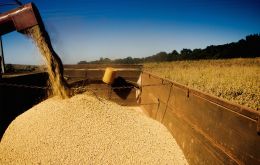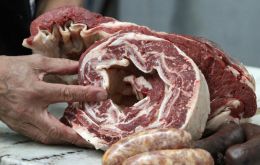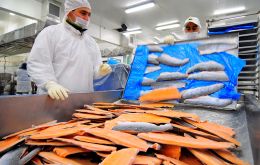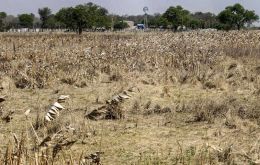MercoPress. South Atlantic News Agency
Agriculture
-
Thursday, January 13th 2022 - 10:02 UTC
Record 2021 trade surplus in Brazil, but complaints about the economy becoming commodities dependent

Brazil managed a US$ 61,01 billion surplus in its trade balance in 2021, which is 21% higher than the US$ 50 billion of 2020 and the best performance since current stats were officially recorded beginning 1989.
-
Thursday, January 13th 2022 - 09:59 UTC
Meat consumption in Argentina fell despite cap on exports

Argentina has recorded a 4.8% decline in meat consumption per inhabitant despite caps on exports imposed by the administration of President Alberto Fernández, which allegedly sought to prioritize the domestic market.
-
Thursday, January 13th 2022 - 09:36 UTC
Paraguay lowers expectations on soy due to drought

Paraguay's Agriculture Ministry has announced between 6 and 7 million tons of soybeans were to be harvested this season against the original projections of 10 million due to the unprecedented weather conditions.
-
Wednesday, January 12th 2022 - 09:36 UTC
Chilean salmon industry shows how strong and influential it can be

The request from indigenous peoples in the south of Chile and dozens of domestic and international NGO organizations banning salmon farming in nature-protected areas was again frozen in the Chilean congress and will have to wait for its consideration in the following legislature when the next government takes office.
-
Wednesday, January 12th 2022 - 09:25 UTC
Guyana's rice exports back on track thanks to Gov't help

Guyana's exports for the year 2021 of approximately 434,535 tons of rice, paddy, and its by-products meant US $ 201 million in revenues, according to Agriculture Minister Zulfikar Mustapha, after new export markets such as the British Virgin Islands (BVI) as well as Estonia and Slovenia were added to the list of buyers.
-
Monday, January 10th 2022 - 21:33 UTC
Colombian President removes tariffs from agricultural inputs

Colombian President Iván Duque has signed into law the new initiative which applies 0% tariffs on imports of inputs for agriculture and livestock production while creating a fund to benefit small and medium local businesses. The measure seeks to lower costs for medium and small farmers, in addition to encouraging the use of environmentally friendly inputs.
-
Monday, January 10th 2022 - 09:28 UTC
World food prices in 2021 remained 28,1% higher than in 2020, FAO report

World food prices fell slightly in December as international prices for vegetable oils and sugar fell significantly from lofty levels, the Food and Agriculture Organization of the United Nations, FAO, reported.
-
Monday, January 10th 2022 - 09:19 UTC
Lack of rain in southern states will reduce the Brazilian 2021/22 soybean harvest

The hydric deficit and above-average temperatures in southern Brazil and southern Mato Grosso do Sul, prevailing since November have significantly damaged the 2021/22 soybean crop. Brazil’s estimated harvest has been lowered by 11.3 million tons to 133.4 million tons, according to a new survey released this week by AgRural.
-
Monday, January 10th 2022 - 09:00 UTC
Biden pledges to protect farmers and consumers with greater competition in beef, pork and poultry processing plants

In one of his first 2022 conference meetings, United States president Joe Bided and members of his cabinet discussed the need for greater competition in beef, pork and poultry processing, and announced a one billion action plan for fairer, more competitive, and more resilient meat and poultry supply chain, helping to bring down prices for consumers and ensure farmers and ranchers get a fair price for their product
-
Friday, January 7th 2022 - 11:52 UTC
Argentina, Cuba sign bilateral deals to foster food sovereignty

Bruno Rodríguez Parrilla and Santiago Cafiero, Foreign Ministers of Cuba and Argentina respectively, Thursday signed in Buenos Aires a bilateral cooperation agreement for Agricultural Development “to promote the food sovereignty of Cuba,” it was announced.